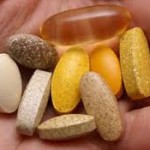Vitamins Hide the Low Quality of Our Food
 We believe so strongly that vitamins are always good for us.? We’ve taken on the habit so fully, we trust the more the better.? Where we’ve gotten duped is by food marketers who use synthetic vitamins to sell unhealthful products. Discovered barely a century ago, vitamins were a breakthrough in nutritional science, providing cures and preventions for some terrifying diseases.? Our growing dependency upon synthetic vitamins to keep ourselves safe, have actually engendered and encouraged the eating habits which are disastrous to our health.
We believe so strongly that vitamins are always good for us.? We’ve taken on the habit so fully, we trust the more the better.? Where we’ve gotten duped is by food marketers who use synthetic vitamins to sell unhealthful products. Discovered barely a century ago, vitamins were a breakthrough in nutritional science, providing cures and preventions for some terrifying diseases.? Our growing dependency upon synthetic vitamins to keep ourselves safe, have actually engendered and encouraged the eating habits which are disastrous to our health.
Nutritionists are correct when they tell us that most of us don?t need to be taking multivitamins. But that?s only because many vitamins have already been added to our food, such that we take them for granted.? Given the poor quality of the typical American diet, this fortification is far from superfluous. If food companies didn?t do so voluntarily, the government might have to require it, to make sure that we didn?t accidentally eat ourselves into nutritional deficiencies.
Mandatory fortification will never be necessary, however, because synthetic vitamins are as essential to food companies as they are to us. To be successful in today?s market, food manufacturers must create products that can be easily transported over long distances and stored for extended periods.? They also need to be sure that their products offer some nutritional value so that customers don?t have to go elsewhere to meet their vitamin needs. But the very processing that?s necessary to create long shelf lives destroys vitamins, among other important nutrients. It?s nearly impossible to create foods that can sit for months in a supermarket that are also naturally vitamin-rich.
None of this takes into account the synergy of interacting vitamins and minerals that help our bodies absorb what they need.? Whole, unprocessed foods are still the best and will continue to be.? Count your vitamins in the number of fruits and vegetables you eat in the course of a day, not how many pills you take.
New Headquarters of Apple to be Powered Entirely by the Sun
 ?We know at Apple that climate change is real,? Apple CEO Tim Cook said last week. ?Our view is that the time for talk is past and the time for action is now.?? Speaking at a technology conference Cook announced the company’s plans to build a 130-megawatt solar farm to power its stores and facilities located in California.
?We know at Apple that climate change is real,? Apple CEO Tim Cook said last week. ?Our view is that the time for talk is past and the time for action is now.?? Speaking at a technology conference Cook announced the company’s plans to build a 130-megawatt solar farm to power its stores and facilities located in California.
Apple will work with First Solar to build the $850-million plant, which will be sited on 1,300 acres in the interior of central California?s Monterey County.? The company’s two campuses in Cupertino, as well as a data center and the state’s 52 Apple stores will all get power from the development.
The announcement is the second major solar commitment made by Apple so far this month. Earlier in February, Apple announced it was building a massive solar-powered global data command center in neighboring Arizona. The planned investment of $2 billion will include a 70-megawatt solar farm to power the facility.
Apple currently has three solar farms; two in North Carolina and one in Nevada. In 2013, Apple began using 100 percent renewable energy to power its data centers, a goal not yet achieved by Amazon, Google and Facebook.
Apple is leading the way in addressing climate change by showing how large companies can serve their operations with 100 percent clean, renewable energy. If they can do it, so can our government. Let’s push for more solar farms and wind farms nation wide!!
Solutions to Plastics in Our Oceans
 We’re treating the oceans like a trash bin: around 80 percent of marine litter originates on land, and most of that is plastic. Plastic that pollutes our oceans and waterways has severe impacts on our environment and our economy. when we damage our water systems, we’re putting our own health and well-being at risk. ?Scientists are investigating the long-term impacts of toxic pollutants absorbed, transported, and consumed by fish and other marine life, including the potential effects on human health.
We’re treating the oceans like a trash bin: around 80 percent of marine litter originates on land, and most of that is plastic. Plastic that pollutes our oceans and waterways has severe impacts on our environment and our economy. when we damage our water systems, we’re putting our own health and well-being at risk. ?Scientists are investigating the long-term impacts of toxic pollutants absorbed, transported, and consumed by fish and other marine life, including the potential effects on human health.
The most effective way to stop plastic pollution in our oceans is to make sure it never reaches the water in the first place. We all need to do our fair share to stop plastic pollution: individuals need to recycle and never litter, but producers of single use plastic packaging need to do more too. We need producers to design packaging so that it is fully recyclable, and so there is less waste. We also need producers to help cover the costs of keeping their products out of the ocean.
Read more about efforts by the Natural Resources Defense Council and what you can do as an individual to help keep our seas clean.

Comments are closed.